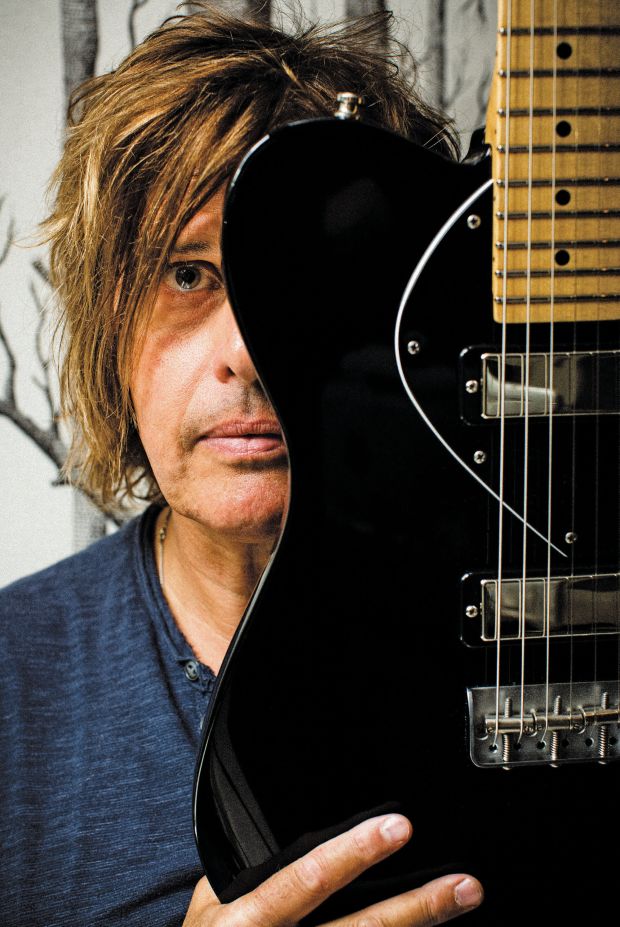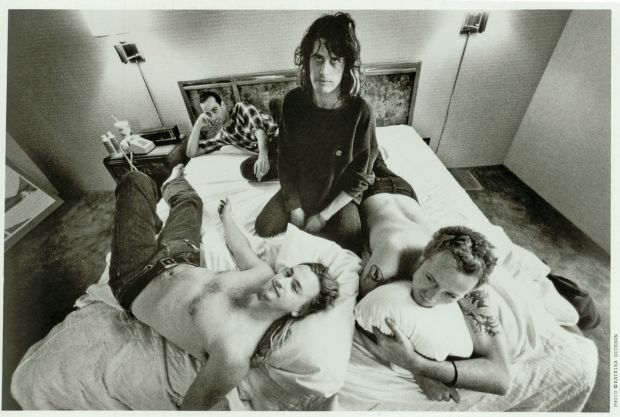
“You know that thing your mom used to say to you when you were little?” Dean DeLeo asks Guitar World with a Iaugh. “It’s true—time really does fly.”
In this case, the amount of time that the guitarist is referring to having flown by is exactly 25 years, which is how long ago his band, Stone Temple Pilots, released their smash debut, Core.
In celebration of the milestone anniversary, the album is now being reissued in a 4CD/DVD/LP Super Deluxe Edition that features a remastered version of the original 12-track effort along with rarities, unreleased demos and B-sides, live recordings, music videos and other goodies.
First released on September 29, 1992, Core arrived in the days just after hard rock had transitioned from the big-hair, shred-crazed approach that characterized the music in the Eighties to the grunge and alternative sound that dominated its early Nineties iteration. And Stone Temple Pilots—which also included DeLeo’s younger brother, Robert, on bass, drummer Eric Kretz and frontman Scott Weiland (known at the time by his surname only)—quickly became one of the biggest rock bands of that moment.
Throughout 1993 the band racked up hit song after hit song, from the darkly aggressive and excessively grungy “Sex Type Thing,” to the swirling technicolor alt-rock of “Plush,” the downcast acoustic balladry of “Creep” to the throbbing grooves of “Wicked Garden.” Core, meanwhile, to date has sold more than eight million copies.
On the heels of that breakout success, Stone Temple Pilots went on to dominate the rock scene for much of the remainder of the decade; their follow-up to Core, 1994’s Purple, debuted at the top of the Billboard charts.
The 2000s, however, have been marked by fits and starts, as well as touched by tragedy on more than one occasion. Weiland, in the throes of a severe and ongoing drug addiction, was in and out of the band, and in December 2015, he died of an overdose while on tour in support of a solo album. In the years following his ouster from Stone Temple Pilots, the singer’s shoes had been filled by Chester Bennington, who, after a successful run, parted ways amicably with STP in 2015 in order to focus his attention on Linkin Park. Then, on July 20 of this year, Bennington took his own life while at home in Los Angeles. When Bennington’s name is brought up during this interview, DeLeo, clearly still deeply shaken by the very recent tragedy, is practically at a loss for words. “We lost an angel,” he says simply.
When it comes to looking back at Core, however, DeLeo is excited to talk and exudes nothing but happiness and appreciation for everything he and his band-mates experienced and achieved in those early days. “I’m gonna say this with great humility,” he says. “When we were putting that record together, Robert, Scott, Eric and myself, we knew we had something very special.” On a recent August morning, DeLeo took some time to discuss the writing, recording and aftermath of that special album.
Putting together this 25th-anniversary package must have been a little bit like jumping back in time for you. What was that experience like?
You know, from time to time I hear the songs from the album on the radio and it takes me back. Especially with Scott’s passing. It would seem like he was just haunting me. Because every time I got in the car he was singing to me. And that’s really, really sad. But what was really interesting in putting this collection together was when we dug into the demos. Those demos were prior to us being in the studio, prior to meeting Brendan [O’Brien, producer of Core]. They’re from when we were in a little rehearsal room in North Hollywood with Robert’s eight-track Fostex. You could hear us talking to one another when the mics were on. You could hear the excitement in our voices. You could hear the vision we had for the songs. And there’s stuff on this collection that no one has ever heard. We kept it very close to our chests. But hearing that stuff is what really brought me back. Right back to that room, man. I can recall all these really, really wonderful moments. Meeting Brendan, and then off to Rumbo Recorders in Canoga Park to do the record, all of it.

What was it like being in the studio with Brendan?
That was just pure fun. A lot of laughs, a lot of great food, a lot of building lifelong relationships. And we managed to play some music. [laughs] Look, man, I’ve had the luxury of doing some pretty wonderful things in my career. I’ve been very, very fortunate. One of the greatest things about embarking upon a recording career was establishing a relationship and a friendship with Brendan O’Brien. Robert and I learned so much from him. And that is one part of my life…there are a lot of ifs and buts, but that is one part I wouldn’t change at all. That relationship we forged with Brendan was really special. On a personal level as well as a professional level.
Let’s talk about some of the album’s most well-known songs. Core kicks off with “Dead and Bloated,” which opens with Scott singing alone through what sounds like a megaphone. But it’s actually your guitar, correct?
Yes. We had my Les Paul plugged in, and Scott is basically singing right into the treble pickup of the guitar.
Was that something you had discussed doing?
Well, we all kind of knew that pickups are microphonic, so we said, “Let’s try this.” So he sang into the guitar and it’s just one of those moments. You never know when you’re in the studio. You can go in and have this wonderful day where everything you pick up or touch and go to play works. And then there are days where it doesn’t. You’re wrestling with it. But that was just one of those moments that worked. We had the guitar plugged in the way we normally had it plugged in and Scott just laid into it. And that’s what you hear on the record.
The next song is “Sex Type Thing.” How did that one come together?
I came up with that descending riff, the B to Bb to A and then to E. And then I immediately went to the pre-chorus section where it goes to B to A to D. That came very quickly. And the verse was something I wrote for another song when I was 15 or 16. And you know the part that’s kind of syncopated? Eric [Kretz] thought we should have something just a little syncopated so he said, “Let’s do something here with this beat.” And that’s when I came up with the chords for that. But it was the main riff that came to me in my head first. And I ran right in and grabbed a guitar and transposed it from my medulla oblongata. [laughs] And that started the whole thing.
In the “Sex Type Thing” demo on this collection, the structure is basically the same, though the overdubbed guitar that plays that higher, arpeggiated part alongside the main riff is more prominent in the mix.
Yeah, it’s that overdubbed guitar where I’m doing the riff kinda on the G, B and E strings. That was probably something we came up with at the last minute. The last overdub is always the loudest, isn’t it? [laughs]
“Creep” is one that went through some changes from the demo version to the take we hear on Core.
It went through a lot of changes. We took out that whole middle section, and lyrically it changed pretty drastically, too. You know, that’s a perfect example of “less is more.” That’s something we’ve always tried to adhere to. It was, “You know what? We don’t need that section. Pull it out. Lose it.” Obviously the song didn’t suffer.
“Wicked Garden,” in contrast, is one that sounds pretty similar in the demo and Core versions.
Yeah, not too far off. That was a song where Robert had the intro, the G to the D to the A sections. And he had the chorus and then I had the verses. We just kind of introduced them to one another and they seemed to dig each other.
“Plush” was something that Robert brought in on his own, correct?
Yes. Robert had all the parts for that one ready to roll.
When you were working on that one could you tell it might be something special?
I didn’t really think in those terms. And, I mean, we put the song way back on the record, too. So I don’t think we were really thinking like that. I think I kinda saw it when the label started stopping in and listening to stuff as we were approaching the end of making the record. Because I saw how those guys were reacting to the track. But I tell ya man, Atlantic, they were very cooperative as far as how we wanted to build not only our record but also our career. Because you get one shot, man. You get one shot. And Atlantic was a great place to be. They really let us do our thing, and then they did their thing. So we released “Sex Type Thing” first and then “Plush” was the second single.
“Sex Type Thing” was a hit, but in some ways it’s also uncharacteristic of the Stone Temple Pilots sound and style. Musically, it’s pretty grungy, and the lyrics, which Scott sings in the first person, were seen by some as being overly aggressive toward women, rather than a critique on that sort of thinking, which seemed to have been Scott’s intention. Were you bothered at all by people’s interpretation?
Oh, I didn’t give a shit. It never crossed my mind. It’s like, “This is us. Take it or leave it. There’s plenty of other music out there if you leave it!” So I never thought on those terms. It was basically a song that wanted to bring some awareness to some really bad stuff that goes down, and still goes down to this day. It’s probably worse now than ever. It was something Scott felt strongly about. We all did. So I don’t even know how it was construed. I just know where we were coming from with it. How anyone else wants to interpret it, that’s up to them.
What gear did you use in the studio?
At the time I didn’t have much of a collection of amplifiers or guitars. And here’s a story: When we moved into Rumbo, we met at the studio at five o’clock the night before we were scheduled to start. Brendan met us there, with his car loaded with guitars and amps, and he and the four of us carried in all of our gear. I don’t know that Brendan O’Brien meets clients at the front door of the studio anymore to load in gear! [laughs] So we met at Rumbo with all our gear and fortunately at the time Brendan had a few amps and a few guitars. So he brought down, oh gosh, of his we used a beautiful Pelham Blue Gibson ES-335. We had a Gibson Les Paul Special he brought down. He brought a Strat with him.
And you know, I was limited in those days. I had three guitars that I brought in: my ’78 sunburst Gibson Les Paul, which was the main guitar on the record—that’s the one where Scott sang into the pickup—and I also had a Tele, a newer one, and I had a Yamaha FG-160 acoustic I had since I was a kid. That’s what we used acoustically on the record. That doesn’t sound like a heck of a lot of stuff, but if you think about it, we had single coils in the Strat and the Tele, we had PAFs in the 335 and the Les Paul, and we had a P-90 there, too. So we had every choice of pickup. Then for amps, it was pretty much my live rig that I still use to this day—my VHT with my Demeter preamp. We ran that stereo through two 4x12s. And then we had a lot of small stuff—Vox stuff, Fender stuff. Things like that that come in pretty handy for overdubs.
Do you recall a moment where you could tell Core was getting big and the whole thing was really taking off?
Yeah, absolutely. We were on tour with Megadeth. It was our first introduction to playing arenas. All of us had been playing clubs from a very young age. In our teens. So we had had our fill of that. And then when STP hit the road we played our fair share of clubs globally. And when we came back we got all these offers to go out with other bands. Megadeth asked us to go out with them, and I’ll tell ya, Mr. Mustaine was very, very kind to us, man. Very supportive. That was an interesting gig because nobody knew who we were. We were simply the opening band. We would come out to an arena that was only a third full. And then we’re trying to do our thing, and you’ve got little pimple-faced boys with Iron Maiden shirts just giving you the finger all night. Like, “Man, this sucks!” They just wanted to see Megadeth. But I’ll tell you what, Dave Mustaine would sometimes come out, and he’d grab the mic and go, “Listen, you fuckers. I personally picked this band to be here. Fucking listen!” It was like, “Holy shit!” Mustaine was amazing to us.
But back to your question—we were on that tour when “Plush” came out. “Sex Type Thing” had definitely set a tone, and it was doing its thing for us. But when “Plush” came out, we looked around and realized, “Hey, you know what? The arenas aren’t empty anymore!” The places were full when we went on. That’s when we saw it happen.
Going back to this time period and listening to all this music again, listening to the demos, thinking about being on the road, did it bring up any feelings about Scott and your relationship back then, and also how everything progressed with him over the years?
Yeah, it did. It was very sad digging into those demos. It took me right back to the rehearsal room, and to all the memories. You know, Scott and I were roommates back then. We rented a house out in Highland Park. And we lived together while writing and recording and touring that first record. And…yeah, man, it was such a different scenario from Chester because, Chester, that was very, very sudden. And unexpected. Whereas it was the complete opposite with Scott. It was, you know, a 12-, 14-year suicide.
But I’ll tell you what, man, Scott was just an incredible human being. An incredibly gifted and talented human being. I mean, you saw the guy’s body, right? He was like a genetic masterpiece. So strong. And whatever he did, it was like, “You wanna go hit golf balls?” And he’s hitting them 200 yards, straight. “Let’s go waterskiing.” He’s just shredding it. He was just that guy. Whatever he did he was really, really good at. And I’ll fucking say this loud and proud: Scott Weiland was one of the best lyricists of our time. His lyrics and his melodies and his delivery…he was the fucking best, man. It was an honor to be onstage with that cat. And it was an amazing place to be there with him while writing a song. I miss that guy. I miss the guy he was. I’ve missed him for about 15 years.
You mentioned Chester. I can only imagine how shocking his death must have been for you, not just on its own but also given what you had experienced not too long before with losing Scott.
You know, we lost an angel, man. We lost an angel. [pauses] I loved Chester dearly, man. He was just an exquisite guy. I really, really loved him. And I’m really, really going to miss him for the rest of my days.
For the past year or so, you and Robert and Eric have been on the hunt for a new lead singer for Stone Temple Pilots. There have been some reports out there about possible candidates, though nothing has been confirmed. Anything you can tell us about the current status of Stone Temple Pilots?
I can’t…but I think we’ll be able to sometime soon. We won’t let you down, man!
Looking back over the past 25 years, what do you think is the legacy of Core?
For me, it’s a reminder. It’s a reminder of a time when there were four young men aspiring to want to make records. And to be able to travel the world to play music. It reminds me of a time when four guys were very, very, very close, and very, very loving. Very much in harmony. And we got to share that. And you know, when you get to share love and respect and harmony and friendship, and then you add into that the intimacy of music? I feel very fortunate, man.

